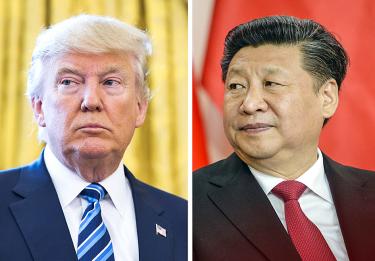US President Donald Trump on Thursday reaffirmed Washington’s “one China” policy in his first conversation with Chinese President Xi Jinping (習近平), an apparent effort to ease tensions after angering Beijing by questioning a major plank of Sino-US relations.
During a telephone call with China’s leader, the US president agreed to “honor” a position that effectively acknowledges that Taiwan is not separate from China.
“President Trump agreed, at the request of President Xi, to honor our ‘one China’ policy,” the White House said in a statement, adding that the two leaders had “extended invitations to meet in their respective countries.”
The White House called the telephone discussion — which came on the eve of Trump’s scheduled meeting with Japanese Prime Minister Shinzo Abe — “extremely cordial,” saying the leaders “look forward to further talks with very successful outcomes.”
Xi, has led the Chinese Communist Party-ruled country since 2012, welcomed Trump’s gesture.
“Xi Jinping appreciates Trump’s emphasis on the American government’s commitment to the ‘one China’ policy and pointed out that the ‘one China’ principle is the political foundation of US-China relations,” the Chinese Ministry of Foreign Affairs said in a statement.
Trump’s insurgent campaign for the White House included frequently lashing out at China, which he accused of currency manipulation and stealing US jobs.
He raised eyebrows in the wake of his election victory with a protocol-busting telephone conversation with President Tsai Ing-wen (蔡英文).
He later threw doubt on the “one China” policy, suggesting that it was up for negotiation and could form part of talks on trade, drawing rebukes from official Chinese media.
Ashley Townshend, an expert on US-China relations at the University of Sydney, said Trump’s apparent capitulation was an indication of the moderating influence of US Secretary of State Rex Tillerson and US Secretary of Defense James Mattis.
“Everyone will be surprised at the speed with which Trump has backed down on this issue,” Townshend added.
The change was unlikely to be conciliatory, but could be read as a sign of pragmatism in the new administration’s approach to its powerful adversary, he said.
“There was a real risk prior to this clarification that the two sides would be unable to even find a way to speak,” Townshend said. “This removes an obstacle to relations, but it doesn’t advance them in any meaningful way.”
Trump’s suggestion that he could restore relations with Taipei — which Beijing views as a nonstarter — had threatened to chill ties with the Asian giant.
Beijing had been prepared to give Trump-the-candidate a pass, China-based Fudan University Center for American Studies director Wu Xinbo (吳新保) said.
“When Trump tweeted a few things about the ‘one China’ policy previously, it was prior to his inauguration, so we can consider those his personal opinion,” Wu said.
“Now that he is in office, he represents the government’s views and, as such, he must emphasize the continuity of policies, such as the Taiwan issue and the ‘one China’ issue,” he added.
Xu Guoqi (徐國琦), an expert in Sino-US relations at the University of Hong Kong, said Thursday’s call showed that the US president had “come to his senses” about a policy that has underpinned ties since former US president Richard Nixon’s time in the Oval Office.
“Without honoring the ‘one China’ policy, the relationship only has one way to go: down to hell,” Xu said, adding that “now the two sides can assume business as usual. They are back to square one.”
A senior European diplomat told reporters he hoped that the call indicated an end to Trump’s “incoherent signals” on China.
“Maybe the phone call marks the beginning of a more rational and consistent policy,” he said.
Source: Taipei Times - 2017/02/11





















